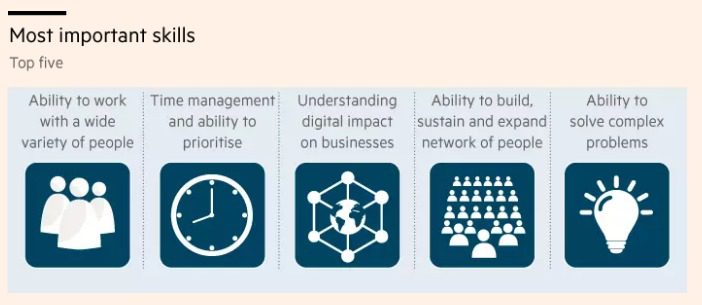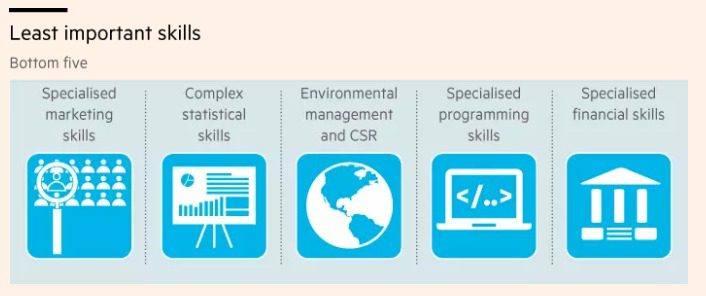The Best Part-Time MBA Programs You Can Find in Seattle

For those who feel stuck in a middle management position, getting an MBA is a great way to get a leg-up on competition and put yourself in the running for higher-level opportunities. Unfortunately, a 9-to-5 job does not leave much time to devote to full-time learning.
However, the majority of MBA programs offer flexible, hybrid, or part-time options to accommodate all sorts of schedules. Below, we offer a rundown on the three best Seattle part-time MBA programs.
The Best Seattle Part-time MBA Programs
Seattle Pacific University School of Business, Government and Economics
At the Seattle Pacific University School of Business, Government and Economics, a full-time career does not have to deter motivated professionals from pursuing higher education. SPU’s part-time program consists of evening and weekend classes, and is designed to fit into a busy schedule. The university markets the program specifically to established professionals looking to integrate valuable MBA knowledge and skills into their current position.
The 45-credit program consists of ten advanced courses and five elective courses. Selecting an emphasis can help professionals tailor their education to their specific business needs. Students can choose any of the following emphases: Human Resource Management, Finance, Management, Cybersecurity, Data Analytics, Social and Sustainable Business, or Information Systems Management.
SPU’s part-time program might appeal to professionals who prioritize integrity and wish to make a positive contribution to their workplace and community. The university requires at least two ethics courses, and underscores the importance of morality in business.
Foster School of Business—University of Washington
The UW Foster School of Business has several options for aspiring MBAs who cannot commit to a standard full-time program. Foster offers an Evening MBA, a Hybrid MBA, and an Executive MBA to accommodate various lifestyles.
Forster’s Evening MBA takes three years to complete. Students in this program have an average of almost seven years of work experience, making this track a great option for more seasoned professionals looking to enhance their contributions at their jobs, or perhaps looking to make a late career change.
The Executive MBA (EMBA) at Foster may also be the right choice for those looking for a program that is compatible with full-time work and life obligations. Though not limited to executives, the EMBA is specifically designed for seasoned professionals seeking knowledge they can apply in their professional lives right away. The 21-month program provides the option to take classes weekly or monthly, to meet the needs of those who might have to commute.
If finding time to commit to on-campus courses seems difficult, Foster’s Hybrid MBA might be a good fit. The program involves quarterly in-person sessions, and the rest of the coursework takes place online.
Albers School of Business and Economics—Seattle University
Seattle University’s Albers School of Business and Economics offers students in the Professional MBA (PMBA) the chance to pursue their degree part-time. This program is ideal for students who want to tailor customize their education to fit their interests and career goals, as electives comprise two thirds of the 54 required credits. Students on the PMBA track must have a minimum of two years of work experience. Graduates of this program have gone on to high-level positions at companies like Nike and Microsoft.
Quinlan Professor and Fulbright Scholar Returns from Research Project in Poland

Maciek Nowak, an Associate Professor at the Quinlan School of Business, recently returned from overseas, where he spent time abroad as a Fulbright Scholar. In a recent interview following his return, he spoke directly about his work with Poland’s postal service, Poczta Polska.
Speaking with the student reporter Monica Sather, Nowak talked about the workshop, his research, and his experience abroad as a Fulbright Scholar.
“I learned more about my background, as I was born in Poland but moved when I was very young. Spending six months in Poland gave me a much better sense of what daily life is like and allowed me to experience many of the traditions that I had taken part in on a much smaller scale while growing up in the U.S. It was just awesome.
I would encourage any faculty member or student to apply to the Fulbright program. Through the Fulbright, you have the opportunity to serve as an ambassador of the U.S., connecting to such a broad range of people of different backgrounds and nationalities while being a part of a group that represents some of the best our country has to offer.”
Nowak spent six months working with Warsaw School of Economics faculty in effort to help the logistics network of the Poczta Polska. He also co-organized the Route Optimization/VEhicle Routing (ROVER) workshop, which brought together 20 of the top North American and European experts in transportation science.
According to his bio page, Nowak has worked with Federal Express, United Parcel Service, and the Georgia Ports Authority in past research projects. He has also received grants from the Federal Highway Administration, the U. S. Department of Transportation, and the U.S. State Department.
Nowak’s research has been published in Transportation Science, European Journal of Operational Research, Computers & OR, and the Journal of Transportation Management.
Read more of Nowak’s interview on the official Quinlan website.
McDonough Professor Named Finalist for 2017 edX Prize

Ricardo Ernst has been named as one of the 10 finalists for the 2017 edX Prize for Exceptional Contributions in Online Teaching and Learning. Ernst is the Baratta Chair in Global Business and professor of operations and global logistics at the Georgetown McDonough School of Business. Continue reading…
Full-Time MBA Battle: New York vs. Philly

Whether it’s Giants vs. Eagles or the Statue of Liberty and the Liberty Bell, New York City and Philadelphia are two cities famous for being at odds with one another. Continue reading…
What Employers Do and Don’t Look for In An MBA Graduate

Earning an MBA can often be a huge boost for graduates entering the job market, from opportunities for upper-level management roles to increased salaries.
But securing that job post-graduation can still be an uphill climb. Even with an MBA, students often find themselves struggling to understand how they fit within a changing job market. As the market continues to shift, understanding exactly what employers are looking for in their MBA applicants—and what they aren’t looking for—can be crucial for graduates as they search for and apply for their perfect job.
Thankfully, a recent survey from the Financial Times looked at the job market from the perspective of employers: what they are in need of in terms of MBA job seekers, and how MBA applicants can be more realistic regarding for the roles for which their new degree will qualify them. Unfortunately for many MBAs, the survey results may come as a surprise when they reflect on what skills they hoped their degree would offer in the first place. Yet, a critical understanding of what employers are and aren’t looking for can help job seekers re-frame the way they understand themselves and their prospective careers.
What Employers Want
The survey looked into the most important skills that employers look for in new MBA talent. Perhaps surprisingly, the five most important skills determined by the survey were actually not core MBA subjects. “Soft skills,” such as the ability to prioritize (desired by 72 percent of employers), the ability to work with a variety of people (76 percent of employers), and the ability for employees to effectively manage their time were the most desired and difficult to find, according to the survey.
The most difficult skills to recruit—the skills companies are sorely in need of—were most commonly named as the ability to use social media for the business’ needs, financial forecasting, big data analysis, brand storytelling skills, and the ability to train others.

The five most important skills, according to the Financial Times survey.
What Employers Don’t Want
The least important skills for an MBA, according to the survey, were those most often thought of as “hard skills,” such as specialized skills in marketing, finance, programming, or complex statistical skills. Similar skills were mentioned as the least difficult skills to recruit—the ability to solve complex problems and specialized marketing skills are often seen as common fare among MBA graduates and therefore a candidate with such skills won’t necessarily stick out.
Many surveyed employers said that past experience with MBA-holding employees had left them disappointed, with the degree-holder having difficulty turning concepts into practice. Many employers said that, while an MBA degree may be a nice bonus for a job candidate, the overall hiring decision is more based on the individual’s industry qualifications, rather than their degree.

These skills may be less necessary than MBA grads anticipate.
What Do You Need To Do?
So far, the results of the Financial Times survey may be disappointing for MBAs who have worked hard for their business education. No need to get concerned just yet, however. The employer response may have less to do with the idea that the skills of an MBA grad aren’t necessary in a company and more to do with a perception gap; the belief that business schools will not teach students the skills they need, and therefore that they do not need MBAs at their company.
Most of the work in convincing a skeptical employer your degree is worthwhile is simply convincing them that the skills learned as part of your degree are the same ones they desire. Many business schools are attempting to change the way MBAs are perceived and the type of skills that are associated with graduates. Julie Morton, Associate Dean of Careers Services and Corporate Relations at Chicago’s Booth School of Business, has already set half of her team to the work of promoting the value of MBA-holders in the workforce. Overall, much of the work will fall on business schools to market their graduates as holding the skills most desired by recruiters.
On a more individual level, however, the survey results also indicate that MBA grads can be more judicious in the roles that they apply to and the way they market themselves to potential employers. By focusing on the skills desired most—and the hardest to recruit—and ensuring that employers know these are the exact skills an MBA education offers, both employer and employee can benefit.
Kogod Introduces New Graduate Certificate in Islamic Finance

American University has launched a new graduate certificate at the Kogod School of Business: the Graduate Islamic Finance Certificate.
The new program was founded by Professor Ghiyath Nakshbendi. He held his first Islamic finance conference at Kogod in 2009 and created two classes on the topic afterward. Following feedback from Kogod’s students and faculty, Nakshbendi officially launched the program for the fall 2017 semester.
“This program offers a special opportunity to become an educational leader in the field,” Nakshbendi says. “I’m excited for what lies ahead.”
Students in the Graduate Certificate in Islamic Finance program can expect:
- Business courses, such as Financial Accounting and International Finance
- Economics courses, such as Economics of the World Regions
- Mathematics-focused courses
- Guest lecturers who offer students real-life perspective from the business world
Nakshbendi has an all-star line up of speakers for the program’s inaugural semester, including CEOs, lawyers, and high-profile Islamic finance professionals from Kuwait, Doha-Qatar, and Bahrain. “I make a point of inviting guest speakers who can help my students with job prospects,” Nakshbendi said.
It’s all about networking for Nakshbendi, and he hopes that his program will attracting Islamic finance professionals to Kogod. His “ultimate goal” is that these professionals will bring their work experience and job contacts with them. Nakshbendi told Kogod that he hopes to place his students at places like Citibank or Goldman Sachs.
Along with launching the Graduate Islamic Finance Certificate, Nakshbendi also founded the American Center for Alternative Finance (ACAF), a non-profit that promotes Islamic Finance and other alternative finance methods in the United States.
Through seminars and conferences, ACAF offers students opportunities to network and gain experience outside of the classroom. Nakshbendi says the organizations helps provide “great supplemental experience” for students.
Nakshbendi hopes the Certificate program is a conduit for success. Outcomes are his priority, and he wants to ensure students are flourishing after graduation.
